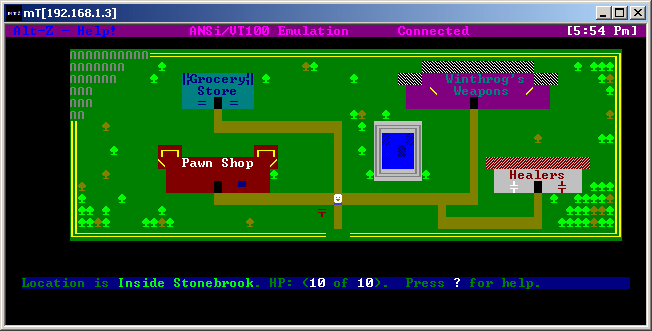| ryandelaplante.com | |
 |
 |
| [ Home | This BBS's History | What is a BBS? | HOW-TO's | BBS Related Links ] |
What is a BBS?BBS stands for Bulletin Board System. Way back before anyone had Internet access in their house there were computers in almost every city that ran BBS's for their local community. These BBS's were run by computer hobbiests, willing to offer their equipment and expertise to benifit the local community. Users would access these BBS's over the phone line using a modem and terminal software. Many BBS's had only one phone line (node) so if you tried to call a BBS that was busy you would just move on to the next BBS until you found one that's wasn't busy. BBS's were all character based (there were no GIF/JPEG pictures). To make screens look appealing they would contain special ANSI sequences which gave the screens colour and used extended ASCII characters to draw shapes and pictures. The user's terminal software had to support the ANSI sequences, otherwise the user would see a bunch of garble on the screen.
 Screenshot of LORD ][, a BBS door game. This is an example of how ANSI sequences and ASCII characters are used together to create nice looking menus and interfaces. Generally most BBS's offered a wide range of services from online games (called door games), forums (called message areas or conferences) and file downloads. There were some BBS's that specialized in certain topics such as genealogy, sports, programming, religion, etc... Some BBS's just offered a large selection of door games users could play. Door games would often let you compete against other users of the system who had played before, and sometimes even let you play against them live if the BBS was multi-node. There were two kinds of message areas: local and echomail. Local message areas were stored on the BBS computer itself and all discussions remained on that BBS. Echomail was mail that was sent out to hundreds or even thousands of other BBS's for other people to read and reply. The most popular echomail network was FidoNet. You could spend many hours browsing the messages in the vast selection of topics and could communicate with people across the world. Don't forget, there was no Internet in the home or even at work (most places) so this was a very thrilling experience. I can remember waiting 2 days for my echomail to be routed to Australia, then it taking 2 more days for the reply to come back to me. Echomail was packed and sent out to the other systems nightly and that's why it took so long. File areas were also an important part of BBS's. Unless you went to the store to buy some software, there was no other place for you to get files except from BBS's. The files were categorized in to file areas and users could browse lists of files along with a description written by the author of the file/program or written by the user who uploaded it to the BBS. There was tons of shareware games, GIF/JPEG pictures, utilities, software patches, text files, and more. Some BBS's even had CD-ROM doors where you could browse files on special shareware cds made for BBS's and download files from them. A cd could hold 640 MB of files, back when most people's hard drives were much smaller than that, so shareware cds were quite popular. Some BBS's relied on users uploading new files to the system to keep their file bases up to date, so they enforced upload/download ratios. Each BBS was kind of like a mini-Internet because they offered everything you need in one place. BBS's that were part of networks like FidoNet were most popular because you could talk to people in other cities and countries through your local BBS. In the early-mid 90's the Internet started becomming popular in the home and by 1998 most dial-up BBS's were gone. The surviving BBS's now live on the Internet and users access them using telnet clients. I'm sure there are still some dial-up BBS's but the Internet offers much better exposure and a larger user base. I've talked about BBS's in the past tense as if they don't exist anymore. I was trying to give a feel of how things were in the past when BBS's were big.
|